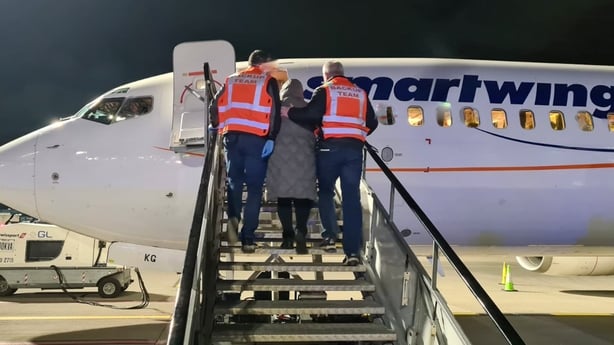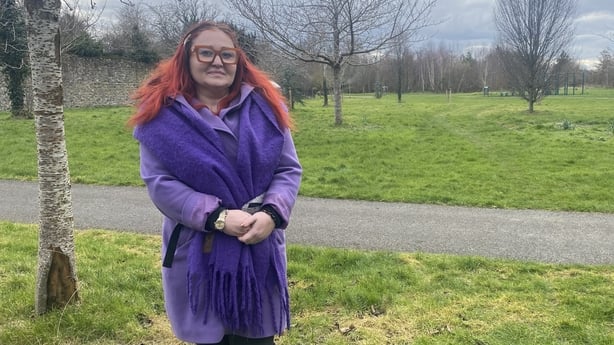A number of people were deported to Georgia on a chartered flight last night, including three women and one child.
It is the first deportation operation under a contract signed by the State late last year for the provision of charter flights for deportations.
In a post on social media, Minister for Justice Jim O'Callaghan said the flight left Dublin for Tbilisi in Georgia "with 32 people who had previously received deportation orders".
He said the flight landed and "the people are back safely in Georgia".
An Garda Síochána said 28 men, three women and one child were deported and that the child was part of a family group (father, mother and child).
The people were accompanied on the flight by gardaí, medical staff, an interpreter and a human rights observer.
We need your consent to load this rte-player contentWe use rte-player to manage extra content that can set cookies on your device and collect data about your activity. Please review their details and accept them to load the content.Manage Preferences
Speaking on RTÉ's Morning Ireland, Minister O'Callaghan said the 32 people had previously been served with deportation orders and were in the State unlawfully.
"If you're seeking asylum and you're not entitled to asylum - don't come to Ireland," he said.
In a statement, the Department of Justice said: "A contract was signed in November last year for the provision of charter aircraft for deportation operation purposes.
"Enforced removals are carried out as a measure of last resort when the person concerned has not removed themselves from the State or availed of assisted voluntary return measures."
Mr O'Callaghan said: "When a person's application for International Protection is refused or they are found to have no permission to be in the State, they are offered assistance to return home voluntarily.
"However, when this option is not availed of, they are liable to be deported by the Garda National Immigration Bureau."
The latest International Protection Accommodation Service (IPAS) report showed there were 2,992 people from Georgia in IPAS accommodation.
In 2023, the top five countries from where people sought asylum in Ireland were Nigeria, Algeria, Afghanistan, Somalia and Georgia.
In a post on X, Tánaiste Simon Harris said: "A fair and firm migration system must ensure deportations are effective and efficient. Today our country recommenced the use of charter flights for deportations. If you don't have a legal right to be here, our system must act and today is evidence that it is and it will."
Georgia was declared a safe country of origin in 2018 but Georgians have remained among the top five nationalities seeking International Protection, apart from a period during the Covid-19 pandemic.
In November 2022, then minister for justice Helen McEntee introduced a faster system of processing applications at the International Protection Office, which resulted in a significant drop in the number of Georgians seeking asylum in Ireland.
Ireland is not part of the Schengen Zone and Georgia is not part of the EU (although it has recently become a candidate) which means visas are required by Georgians to come into the country.

Minister of State for Migration Colm Brophy said: "Chartered deportation flights will now form an important part of removing people who do not have a right to remain in our country. I welcome this operation and thank the gardaí and all the staff involved in its success.
"I look forward to now seeing chartered flights in conjunction with voluntary deportations, ensuring that we will have a firm and effective system in place to deal with deportations going forward."
Last year, 2,403 deportation orders were signed which was an increase of 180% compared to 2023.
According to the Department of Justice, 1,116 people left the State last year under various mechanisms such as enforced deportation and voluntary returns.
Concerns over unstable political situation in Georgia
"People are very worried about the situation because the political situation is not very stable in our region," says Tamara Samkana, the founder of the Georgia Information Centre in Ireland.
She is also a certified Courts Service translator, who sometimes has to deal with immigration cases. She says, therefore, that the first chartered deportation flight to leave the State did not come as a big shock.
Talks around Georgia's EU membership have stalled, as the south Caucasus country grapples with a protracted political crisis. She says the fact that Georgia is not an EU country makes prospective employers less likely to issue visas or sign contracts that would allow Georgian people who want to stay here to get and stay in employment.

She says faced with no other option, even for more skilled jobs that would help to fulfil shortages here, some people are going down the route of entering the international protection system.
According to figures provided by the Department of Justice, there were 134 enforced deportations last year, up from 52 in 2023. There were just 26 enforced deportations in 2022 and five in 2021, but much of this period was covered by a moratorium on deportations which came into effect in the latter part of 2020 and continued for the first eight months of 2022.
During this period, only those whose presence in Ireland was deemed contrary to the public interest would have been deported.
In its statement today the Department emphasised that it was its preferred option remains to return people voluntarily, if they no longer have the right to remain here.
"Enforced deportation operations are complex and costly," it says. "They often involve investigations, detection, detentions in custody, legal challenges, flight costs and confirmation with the return country that the person is their citizen."
Yesterday's flight was operated by Air Partner Limited and the €102,476 cost was for a one-way flight.
The Department of Justice says the total future expenditure with this company will be dependent on the number of chartered flights provided in the future.
The Department says references to the contract costing the State €5 million relate to its potential value over the contract's lifetime. It is currently for three years with the potential to extend it by two more years.
A voluntary return programme is available to help people return to their country of origin, but this can only be accessed in the period before a deportation order is served.
Many working in immigration law believe there needs to be a better system that does not clog up the process for those genuinely seeking asylum in Ireland.
The Minister for Justice can also use Section 49 humanitarian grounds, under the 2015 International Protection Act, which can grant permission to remain in the State to applicants who may not qualify for refugee or protection status.
"I'm not talking about all immigration cases of course," explains Ms Samkana, who says everyone should have the right to have their case assessed individually.
"But many of them are economic migrants rather, than asylum seekers per se. I would never undermine the genuine cases and the importance of supporting genuine refugees, but a large number of economic migrants are going down the lane of seeking asylum, because it now provides them with the opportunity to get work permission."
She said many people from Georgia wished to obtain a work permit and to provide for themselves, rather than relying on the state, but this was not easy to do under the current system.
She says a simpler system similar to the one that operates in Germany, where work permits are easier to obtain for those genuinely wanting to work, could be emulated here.
In the Georgian capital Tblisi, there have been nightly rallies since November, when the ruling Georgian Dream party, now in its fourth term in power, said it was suspending European Union accession talks until 2028, abruptly halting a long-standing national goal.
The demonstrations have drawn a swift crackdown by police, resulting in hundreds of arrests and beatings, according to human rights groups. Georgians have been demanding new elections following a vote in October which opposition parties say was rigged in favour of Georgian Dream. The party has said the vote was free and fair.
People from Georgia have been coming to Ireland in increasing numbers since 2000 and 1,745 people were registered to vote from Ireland in the recent elections at the Embassy.
Additional reporting: Eleanor Burnhill

